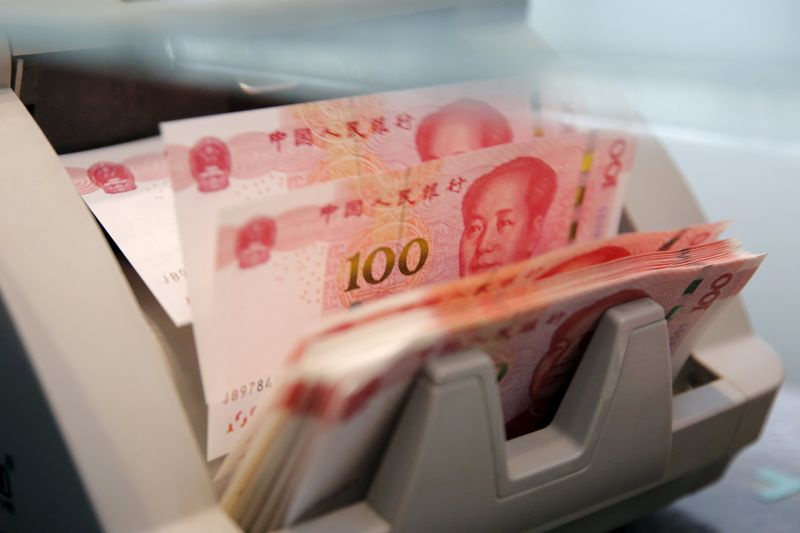By Meng Meng and Kevin Yao
BEIJING/SHANGHAI (Reuters) - China's foreign exchange reserves surprisingly rose in March, the first monthly gain since November, as cooling expectations of U.S. interest rate hikes eased pressure on the yuan.
Chinese authorities have taken a raft of measures to curb outflows sparked by concerns over the slowing economy and U.S. interest rate rises, and intervened in the currency market to support the yuan
China's foreign exchange reserves - the world's largest - climbed $10.26 billion in March to $3.21 trillion, central bank data showed on Thursday. The reserves beat a Reuters poll forecast of a drop to $3.18 trillion from $3.20 trillion in February, but are still down sharply from a peak of $3.99 trillion in June 2014.
The reserves fell by $28.57 billion in February, after plummeting $99.5 billion in January and $107.9 billion in December, the biggest monthly drop on record.
"Looking ahead, we believe that the pressure on CNY will moderate somewhat, while the capital outflows are likely to continue over the foreseeable future," said Zhou Hao, senior emerging markets economist at Commerzbank (DE:CBKG) in Singapore.
CURRENCY VALUATION EFFECTS
Analysts believed the rise in reserves in March was partly due to favorable currency valuation effects, as the euro and Japanese yen strengthened against the U.S. dollar in the month.
Zhou estimated that the valuation effect was about $30 billion in March, implying net outflows in the month.
Recent data showed capital outflows from China have moderated, in part helped by expectations the Fed will slow the pace of interest rate rises this year. Federal Reserve Chair Janet Yellen's comments last week that the U.S. central bank should proceed cautiously in adjusting policy have caused a broad-based retreat in the dollar.
Chinese officials have said the economy was showing signs of improvement while capital outflows were easing.
To be sure, analysts believe that China still faces a tough job keeping the yuan stable, particularly at a time of persistent supply glut and tepid domestic demand.
The yuan will come under renewed downward pressure if the U.S. dollar rises significantly in coming months, a policy adviser to the People's Bank of China said last month.
The PBOC has moved to curb currency speculation since late December 2015, including limiting yuan-based funds' overseas investments and implementing a reserve requirement ratio on offshore banks' domestic yuan deposits. It has also started to manage the yuan against a basket of currencies.
"The currency policy changes put in place after mid-January are showing a strict adherence to the basket peg. It is a more disciplined policy," said Tim Condon, head of Asia research at ING in Singapore.
"The Chinese government sees the narrowing of the foreign reserve declines as a welcome side effect of the policy."
The PBOC published forex reserves denominated in the IMF's Special Drawing Rights (SDR) for the first time. The reserves were equivalent to 2.28 trillion SDR.
The central bank said the SDR measure would help limit valuation changes in the reserves caused by currency volatility.
"This would also help enhance the role of the SDR as a unit of account," the central bank said in a statement.
The IMF admitted China's yuan into its benchmark currency basket in November last year, a victory for Beijing's campaign for recognition as a global economic power.

($1 = 6.4712 Chinese yuan)